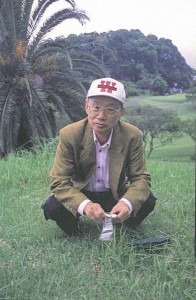 Satoshi Omura, for many years Wesleyan’s Max Tishler Professor of Chemistry, was awarded a share of the Nobel Prize for Medicine this morning for developing a new drug, Avermectin. A derivative of that drug, Ivermectin, has nearly eradicated river blindness and radically reduced the incidence of filariasis, which causes the disfiguring swelling of the lymph system in the legs and lower body known as elephantiasis.
Satoshi Omura, for many years Wesleyan’s Max Tishler Professor of Chemistry, was awarded a share of the Nobel Prize for Medicine this morning for developing a new drug, Avermectin. A derivative of that drug, Ivermectin, has nearly eradicated river blindness and radically reduced the incidence of filariasis, which causes the disfiguring swelling of the lymph system in the legs and lower body known as elephantiasis.
Professor Omura’s association with Wesleyan began in 1971 when he spent a year and a half working with the late Max Tishler, professor of chemistry. During this time, he isolated a new species of microorganism, Streptomyces avermitilis, which is the source of avermectin. He and Prof. Tishler gave their findings to Merck, Sharp & Dohme which developed the derivative ivermectin which prevents river blindness. Throughout their lives he stayed in touch with Max and Betty Tishler; making sure to visit them and the chemistry department at Wes whenever he was in the United States. In 1994, Wesleyan awarded Dr. Omura a Doctor of Science honorary degree.
Over the last few years I have had the honor of visiting with Dr. Omura and celebrating his accomplishments. He has remained dedicated to the pursuit of science and the arts, finding in nature the possibilities of alleviating suffering and promoting human flourishing. Long a pioneer in “discovering bioactive chemicals derived from naturally-occurring microorganisms,” he has also found ways to connect the arts to human well-being.
Congratulations to Satoshi Omura for this well-deserved recognition of his extraordinary achievements!



I had the privilege of working in Dr. Tishler’s laboratory in the summer of 1970, however I don’t believe I ever met Dr. Omura. Nevertheless, I am thrilled to hear about the connection and the contribution Max made to training this outstanding scientist. I am a Wesleyan faculty child (son of Vincent Cochrane, Biology, ca. 1948-1982), and the quality of the science done at Wesleyan continues to amaze me.